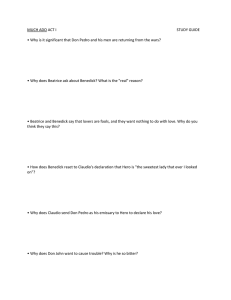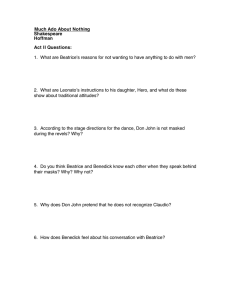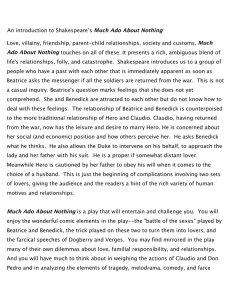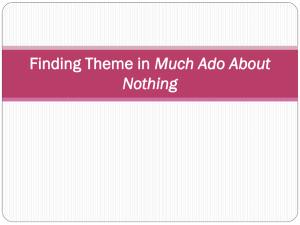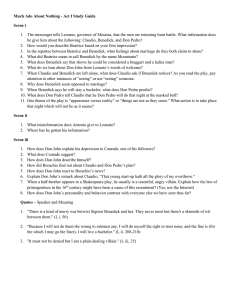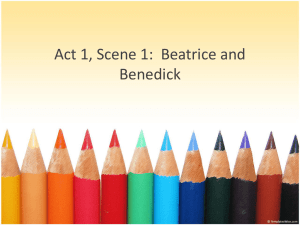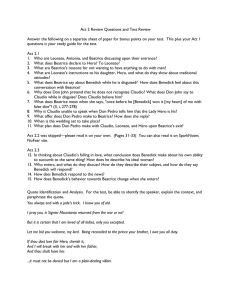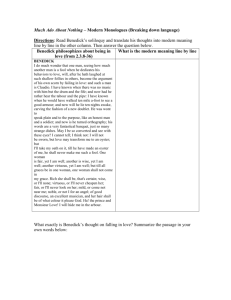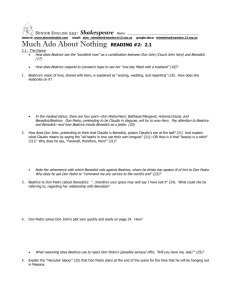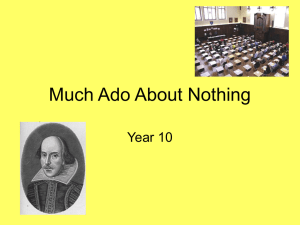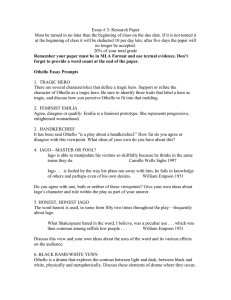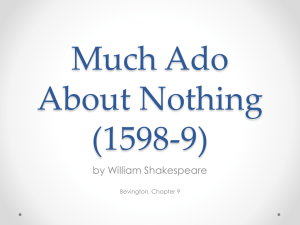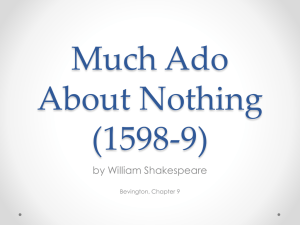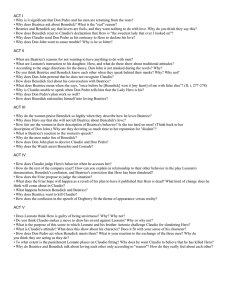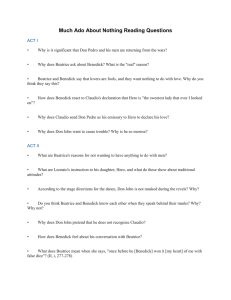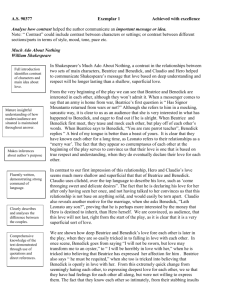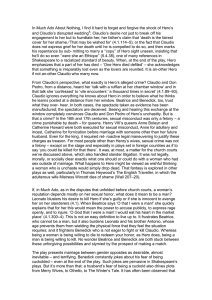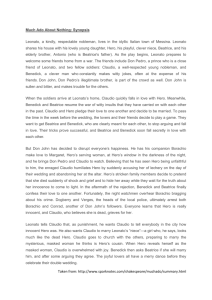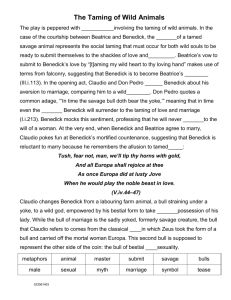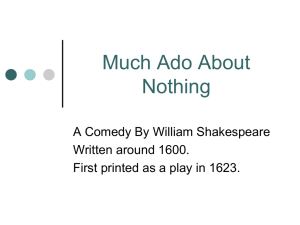Much Ado About Nothing
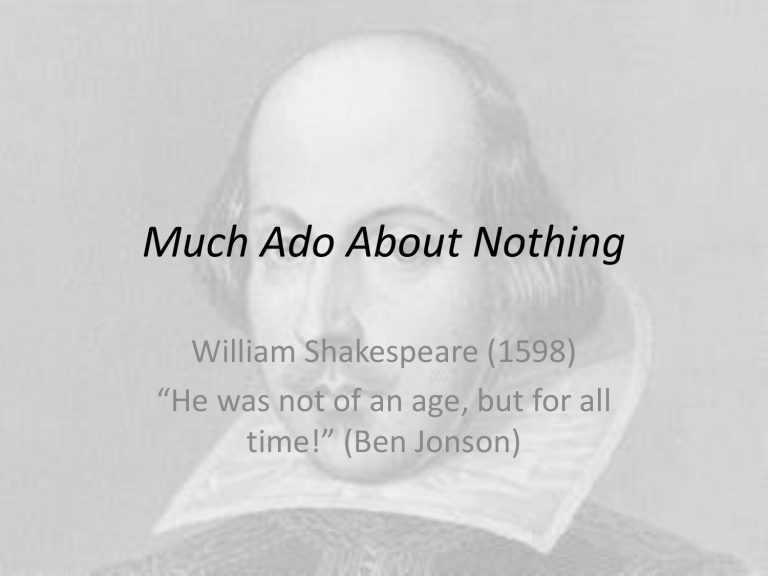
Much Ado About Nothing
William Shakespeare (1598)
“He was not of an age, but for all time!” (Ben Jonson)
William Shakespeare
• Birth: April 23 , 1564 in Stratford
• Death: April 23 , 1616
• Attended grammar school until age 15 and married at age 18
• Wrote plays from 1592-1612, most of which were performed at The Globe
– 37 plays
– 154 sonnets
– 5 major poems
The True Author
• Anti-Stratfordians, people who deny
Shakespeare’s authorship , charge that a middleclass author from a small town could not have imagined the lives of kings and nobles.
• They propose that the real author is someone who came from a higher social class and a more prestigious education.
• Since Shakespeare was quite well-known in his own time, there would need to have been an extraordinary conspiracy to conceal the identity of the real playwright.
A Tragicomedy
• A play that encompasses elements from both tragedy and comedy . The plot typically begins with tragic implications that are happily avoided at the drama’s end.
– Tragedy: a serious and often somber drama that typically ends in disaster and that focuses on a character who undergoes unexpected personal reversals . It represents the experiences of noble characters.
– Comedy: an amusing and entertaining drama that ends happily and presents the “ lighter side ” of life. It represents the experiences of ordinary people.
• Much Ado is a play of love, villainy, friendship, parentchild relationships, society and customs
Characters
• Leonato – Governor of Messina and father of Hero, conventional and grief-stricken
• Hero – Leonato’s daughter, chaste and docile
• Beatrice – Leonato’s niece, spirited and witty
• Benedick – Young lord of Padua, brave and quick-witted misogynist (dislikes and mistrusts women)
• Claudio – Young lord of Florence, easily swayed by outer appearances
• Don Pedro – Prince of Aragon, courtly and conventional
• Balthasar – singer attending Don Pedro, whose out-of-key love song sets the tone of the play
• Don John – Don Pedro’s illegitimate brother, envious and mischief-maker
Summary
• Main plot: Obstacles in the union of young
Claudio and Hero
– Conventional
– “The villainous luring of Claudio into the mistaken belief that Hero is unchaste ”
• Subplot: Battle of the sexes between older and wiser Beatrice and Benedick
– Intellectual, witty, and humorous
– “The benevolent luring of Beatrice and Benedick into mutual declarations of love ”
Summ More
• Beatrice and Benedick are self-conscious makes them indifferent to conventional niceties. If they do not declare their love , it is because they are too defensive or too wise to play society’s conventional game .
• Don John is a radically antisocial human being who refuses to observe the appropriate code of manners .
Language
• Pun: a play on words that capitalizes on a similarity of spelling and/or pronunciation between words that have different meanings .
• Innuendo: an indirect or subtle and usually derogatory implication in expression; an insinuation.
Claudio: Now you talk of a sheet of paper, I remember a pretty jest your daughter told us of.
Leonato: O, when she had writ it and was reading it over, she found Benedick and Beatrice between the sheet.
– The word “ sheet ” is used to refer to a piece of paper and used to refer to a bed sheet, with an innuendo placed in between about Beatrice and Benedick.
Language
• Clever word play: verbal wit based on the meanings and ambiguities of words.
Benedick: What, my dear Lady Disdain! Are you yet living?
Beatrice: Is it possible Disdain should die while she hath such meet (suitable) food to feed it as
Signior Benedick? Courtesy itself must convert to
Disdain if you come in her presence.
– The word “ disdain ” is used as a name for Beatrice and as a description of her attitude toward Benedick.
Themes
• The nature of attraction between man and woman
• The role of marriage in society
• Gender roles
• The nature of truth
• Reality versus appearance
Modern Connections
• The innocent being wrongfully accused .
• The romance: Friends serve as “go-betweens”, or in some way help potential lovers come together.
• The public’s disdain for illegitimate children.
What do you think?
• Men and women should marry persons of a similar social and economic status as themselves.
• People choose with whom they fall in love.
• It is better not to marry than to marry and risk being cheated on by your spouse.
• Most people can be trusted to be faithful in marriage.
• Men are attracted to women who are assertive and bold.
